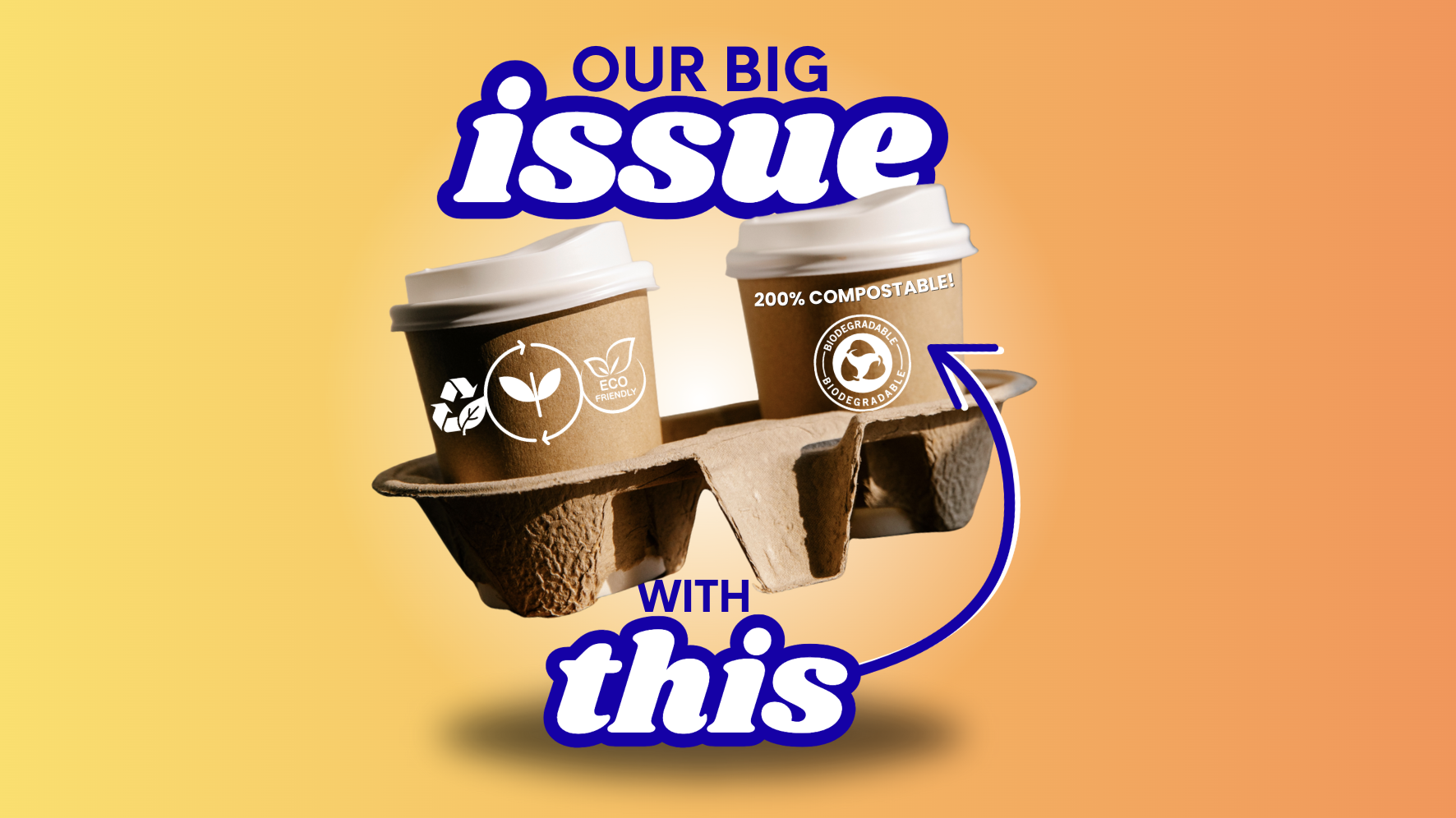Our (BIG) issue with takeaway cups & containers
We’ve seen it all: commercially compostable, bio-degradable, eco-friendly, home compostable, plant-based... single-use takeaway containers are a BIG issue around the world and in Aotearoa. ⬇️
In New Zealand, we throw away 290 million coffee cups each year.
To counter this issue, the main solution pushed by the packaging industry and businesses is to try to reduce the amount of waste going to landfills, using “compostable” cups and containers.
For us, as consumers, it may be nice to think that we are being “greener” by opting for these friendlier single-use options with lots of green words and plant logos all over our takeaway cups. But is it a good solution?
Or are we seeing retailers and consumers being misled by “green” marketing claims? We’ll try to answer this below! ⬇️
Is Compostable Packaging working?
This is what the Ministry for the Environment is currently stating (July 2025):
“Compostable alternatives often require processing in a commercial composting facility to break down. These are not available everywhere in Aotearoa New Zealand. In general, bio-based plastics behave in a similar way to conventional plastics and will not degrade in the same way as their original source material. If these plastics become litter they can harm wildlife in the same way as conventional fossil fuel plastic products.”
Compostable Packaging is not the solution, especially in our country with limited facilities and no official standard defining what can and cannot be home composted in Aotearoa New Zealand.
Why is it not the solution?
We are usually using a single-use cup or container for a few minutes, when it still needs a LOT of resources to be produced, transported, collected and transported again (landfill or composting facility*).
*Our home compostable items collected during local events are taken to Tirohia, Waikato.While commercially compostable is not compostable in Taranaki, home compostable packaging is not a valuable material to produce good compost (unless food scraps). It also requires a controlled composting environment to decompose properly and quickly.
Microplastics from disposable cups are leaching into hot water. (About 25,000 micron-sized microplastic particles for a 100 ml cup after 15 minutes… Source here.)
Compostable packaging creates contamination risks as they cannot be recycled, and they release more methane if they end up in landfills (by decomposing anaerobically, without oxygen).
Some compostable packaging contains “forever chemicals” like PFAS, which are harmful to human and soil health.
As we mentioned earlier, there is a lack of standardisation regarding what packaging is “home compostable”, and there is no official standard in Aotearoa NZ yet.
What about bioplastics? Packaging made of corn and sugar can potentially be even worse, as they require land, and usually use lots of pesticides and GMOs. We could also use the food produced to feed people!
Compostable or biodegradable products are a starting point, but they cannot be the solution. They still encourage single-use waste, create risks, and involve a complex process of producing, transporting and disposing.
So, what can we do?
Bring your own cup and containers! All cafés are able to accept clean cups under the Food Act, and a LOT of local cafés offer a discount when you bring your own. Visit our map here.
Encourage your local café to promote reusable cups. Some ideas can be to have a mug library or to join a successful cup lending scheme (like Again Again).
Avoid takeaways altogether. Make time to have a seat, enjoy the view or have a nice chat.
Start the conversation. Bring attention to your friends and colleagues about the impact of single-use packaging, and think of ways to reduce your waste and not impact the environment.
Learn and get involved. There are lots of things happening across Aotearoa that look at reducing single-use takeaway containers. You’ve probably heard of Takeaway Throwaways, UYO, Incafe’s 4evercup, Again Again or similar initiatives.
Ask your local café about their plan for disposing of the commercially compostable cups they hand out. Do they have a commercial compost collection?
Dispose of cups properly. If it’s a home compostable cup and there’s no composting bin around, make sure you don’t contaminate the recycling bins. Single-use coffee cups are not recyclable. That’s it. Put them in the landfill bin instead.
Learn more
Zero Plastic options in Taranaki: explore our interactive map here *
* Contact us if we should add more local businesses to our mapThe problem with compostable packaging: local business InCafé share their story to look for the best packaging option for their coffee (May 2024)
Book a FREE tour of the New Plymouth MRF Recycling facility here
Curious about our Zero Waste programme? Find more info here!
You will also find lots of information about reducing, reusing and recycling rubbish here



